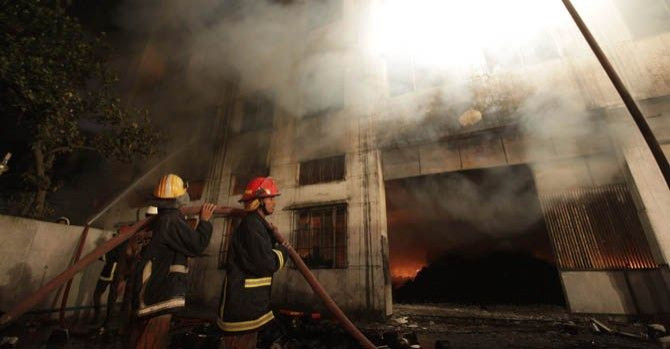Bangladesh Garment Factory Fire Was Sabotage: Inquiry

A fire at a garment factory in Bangladesh last month, killing more than hundred workers and injuring even more, was an act of sabotage, a Bangladeshi government committee investigating the incident has found.
Bangladesh's home ministry formed the committee Nov. 25, a day after the fire at the nine-story Tazreen Fashion factory in the Ashulia industrial belt, 30 kilometers (18 miles) north of the capital Dhaka. At least, 110 people died in the incident.
The committee, which presented its findings to the home minister Monday, said it was not clear who was responsible for the sabotage, news agencies reported citing officials who read the report. The government is yet to make the committee findings public.
The report accused Delwar Hossain, the owner of Tazreen Fashions, of "criminal negligence" and recommended authorities press murder charges against him for the death of the factory workers, a home ministry official who spoke to the Wall Street Journal said.
The head of the inquiry, Main Uddin Khandaker, told the BBC that managers had prevented workers from escaping the blaze.
Nine mid-level officials were accused of preventing workers from leaving the building when the fire started, and padlocking exits, BBC has reported.
Hundreds of workers, who got trapped in the building, were forced to leap from high windows to escape the raging fire and smoke. Most of the victims died as they jumped from the building, news agencies had reported citing Bangladeshi police.
The cause of the fire — the worst accident that has hit the booming garment industry in recent years — was initially attributed to poor electrical wiring.
The owner of the plant, Delwar Hossain, had told reporters after the blaze that he believed it was started deliberately but gave no details, according to an AFP report.
The factory made clothes for international brands including Dutch chain C&A and the Hong Kong-based Li & Fung company.
Bangladesh is the world's biggest exporter of clothing after China and has around 4,500 garment factories that manufacture clothes for brands including Tesco, Wal-Mart, JC Penney, H&M, Marks & Spencer, Kohl’s and Carrefour. However, enforcement of safety standards at the factories is believed to be lax, which has led to several accidents in the past.
In June, more than 300 garment factories in Ashulia were shut down for almost a week, following five days of violent protests by a half-million laborers demanding better wages.
Hundreds of people were injured in the unrest, during which tens of thousands of laborers clashed with the police, vandalized more than 100 vehicles and erected road blockades that affected the industry.
© Copyright IBTimes 2024. All rights reserved.






















